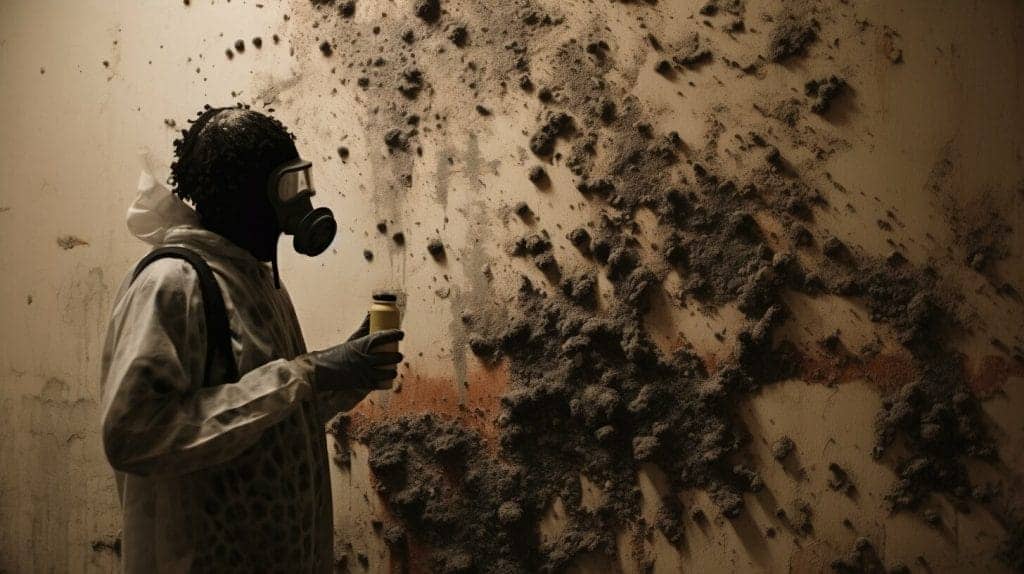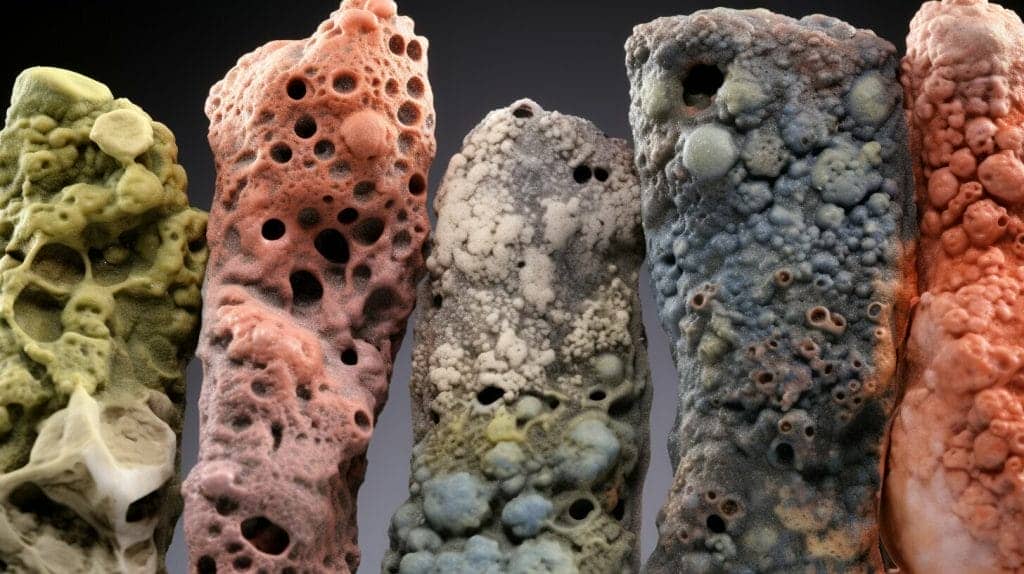Mold-induced asthma is a common condition that affects many individuals. Medical guidelines for mold-induced asthma prevention and treatment can help individuals manage their symptoms effectively. These guidelines are essential to follow to prevent asthma attacks and improve overall asthma control.
This section will provide an overview of the medical guidelines for mold-induced asthma, focusing on prevention and treatment strategies. It will also highlight the importance of adhering to these guidelines to effectively manage mold-induced asthma.
Key Takeaways
- Medical guidelines are essential for mold-induced asthma prevention and treatment.
- Following these guidelines can help individuals manage their symptoms effectively and prevent asthma attacks.
- Adherence to medical guidelines is important for optimal asthma management.
Understanding Mold-Induced Asthma
Mold-induced asthma is a type of asthma triggered by exposure to mold. The symptoms of mold-induced asthma are similar to those of other types of asthma, including coughing, wheezing, chest tightness, and shortness of breath. However, these symptoms may occur more frequently and severely in individuals with mold-induced asthma when exposed to mold.
Diagnosing mold-induced asthma can be challenging, as the symptoms can be attributed to other respiratory conditions. A doctor may perform a physical exam, lung function tests, and allergy tests to diagnose mold-induced asthma. It is essential to identify mold as a potential trigger for asthma attacks, especially for individuals with a history of allergies or asthma.
Common symptoms of mold-induced asthma include:
- Coughing
- Wheezing
- Chest tightness
- Shortness of breath
- Runny or stuffy nose
- Itchy or watery eyes
- Sneezing
If individuals experience any of these symptoms, they should seek medical attention from a healthcare professional to diagnose and manage their condition.
Managing Mold-Induced Asthma
Mold-induced asthma can be managed with a combination of medications and lifestyle modifications. The goals of management are to control symptoms, prevent asthma attacks, and reduce exposure to mold. Individuals with mold-induced asthma should work with a healthcare professional to develop an individualized management plan.
Medications for Mold-Induced Asthma
Inhaled corticosteroids are often prescribed as a first-line treatment for mold-induced asthma. These medications work by reducing inflammation in the airways, which can help to control symptoms. Short-acting bronchodilators, such as albuterol, are also used to provide quick relief during asthma attacks.
For individuals with moderate to severe asthma, long-acting bronchodilators may be prescribed in addition to inhaled corticosteroids. These medications open up the airways and help to prevent asthma attacks. Leukotriene modifiers, such as montelukast, may also be used as an alternative to inhaled corticosteroids.
Lifestyle Modifications for Mold-Induced Asthma
Avoiding exposure to mold is an essential part of managing mold-induced asthma. Individuals should aim to reduce mold growth in their homes and workplaces by fixing leaks and controlling humidity levels. They should also avoid outdoor activities during times when mold spore counts are high.
Air purifiers with HEPA filters can also be used to remove mold spores from the air. Individuals should also regularly clean air conditioning filters to prevent the buildup of mold.
Environmental Modifications for Mold-Induced Asthma
Individuals with mold-induced asthma may benefit from environmental modifications, such as using dust mite covers on bedding and removing carpets and upholstered furniture from their homes. Hard flooring surfaces and washable curtains can help to reduce mold growth.
It may also be helpful to use a dehumidifier to keep indoor humidity levels below 50%. Regularly cleaning and maintaining ventilation systems can also reduce the risk of mold growth.
Prevention of Mold-Induced Asthma
Mold-induced asthma can be prevented by taking proactive measures to reduce exposure to mold. This is particularly important for individuals who have a history of asthma or allergic reactions to mold. By implementing preventive strategies, mold-induced asthma can be effectively managed.
Preventing Mold Growth in Homes and Workplaces
One of the key strategies for preventing mold-induced asthma is to prevent mold growth in homes and workplaces. This can be achieved through the following:
| Preventative Measures | Description |
|---|---|
| Controlling humidity levels | Maintaining indoor humidity levels between 30-50% can prevent mold growth. |
| Proper ventilation | Ensuring proper ventilation in areas prone to moisture, such as bathrooms and kitchens, can prevent mold growth. |
| Cleaning regularly | Cleaning surfaces regularly and removing any visible mold can prevent mold growth. |
Avoiding Exposure to Mold
Another important strategy for preventing mold-induced asthma is to avoid exposure to mold. This can be achieved through the following:
- Avoiding damp areas
- Wearing a mask when cleaning areas prone to mold growth
- Avoiding outdoor activities during times of high mold counts
By taking these preventive measures, individuals can reduce their risk of developing mold-induced asthma and effectively manage existing symptoms.
Understanding Mold Toxicity
Mold-induced asthma can lead to a range of complications, including the development of mold toxicity. Mold toxicity occurs when an individual is exposed to high levels of mold and its associated toxins, which can have several negative effects on the body.
The symptoms of mold toxicity can range from mild to severe and include respiratory issues, headaches, fatigue, and neurological symptoms. Prolonged exposure to mold toxins can exacerbate asthma symptoms and lead to the development of other health issues, such as allergies and autoimmune diseases.
It is essential to identify and address mold exposure promptly to prevent the negative effects of mold toxicity. Seeking medical attention for asthma symptoms and following prevention and management strategies is crucial for individuals with mold-induced asthma.
Holistic Treatment Options at Oasis Medical Institute
Oasis Medical Institute in Tijuana, MX offers a range of holistic treatment options for mold-induced asthma. The integrative approach to medicine emphasizes both conventional and alternative therapies to address the underlying causes of mold toxicity.
Dr. Francisco Contreras MD, the medical director of Oasis of Hope Hospital in Tijuana, is a pioneer in integrative cancer treatment and has more than 40 years of experience in integrative medicine. The holistic approach to mold-induced asthma treatment at Oasis Medical Institute aims to provide comprehensive care for individuals with asthma triggered by mold exposure.
“At Oasis Medical Institute, we understand that mold-induced asthma can have a significant impact on an individual’s quality of life. Our goal is to provide personalized treatment that not only manages symptoms but also addresses the root cause of mold toxicity.”
The holistic treatment options for mold-induced asthma at Oasis Medical Institute include a range of alternative therapies, such as acupuncture, ozone therapy, and hyperthermia. These therapies aim to strengthen the body’s natural defenses, boost the immune system, and reduce inflammation caused by mold exposure.
In addition to alternative therapies, the comprehensive treatment program also includes conventional treatments such as medication management and respiratory therapy. The combination of conventional and alternative therapies provides a tailored approach to mold-induced asthma treatment that addresses the unique needs of each patient.
The team at Oasis Medical Institute works collaboratively with patients to identify triggers, reduce exposure to mold, and develop a treatment plan that supports optimal asthma management. The holistic approach to mold-induced asthma treatment at Oasis Medical Institute prioritizes prevention, management, and personalized care.
Mold Toxicity Treatment Program at Oasis Medical Institute
Oasis Medical Institute in Tijuana, MX offers a comprehensive Mold Toxicity Treatment Program that utilizes an integrative approach to medicine. This program combines conventional and alternative therapies to address the underlying causes of mold-induced asthma.
Led by Dr. Francisco Contreras MD and his team of experienced healthcare professionals, this holistic Mold Toxicity treatment program provides personalized care for each patient. The program includes a thorough evaluation of the individual’s health history, lifestyle, and environmental factors. Based on this evaluation, a customized treatment plan is created to optimize asthma management and overall health.
With a focus on prevention and management, the program emphasizes the importance of reducing mold exposure and implementing healthy lifestyle changes. In addition to traditional medications, the program includes complementary therapies such as nutritional counseling, detoxification protocols, and mind-body therapies.
The Mold Toxicity Treatment Program at Oasis Medical Institute is designed to provide comprehensive and effective care for individuals with mold-induced asthma. If you are seeking a holistic approach to manage your mold-induced asthma, contact Oasis Medical Institute today at 866-868-1992 for more information about the program.
Booking a Consultation at Oasis Medical Institute
To book a consultation at Oasis Medical Institute for mold-induced asthma treatment, interested individuals can call 866-868-1992 or visit their website to request an appointment. It is important to seek professional guidance for personalized treatment and optimal asthma management.
Integrative Approach to Mold Toxicity Treatment
At Oasis Medical Institute, an integrative approach to mold toxicity treatment is used to provide comprehensive care for individuals with mold-induced asthma. This approach combines conventional medical therapies with alternative therapies to address the underlying causes of mold toxicity.
The integrative approach aims to provide a personalized treatment plan for each patient and consider the whole person, including their physical, emotional, and mental health. It involves working with a team of professionals, including medical doctors, nutritionists, and counselors, to provide a holistic approach to care.
The conventional medical therapies used by Oasis Medical Institute include medications, such as inhalers and oral medications, to control asthma symptoms and prevent asthma attacks. These treatments are complemented by alternative therapies, such as nutritional therapy, detoxification, and stress reduction techniques, to promote overall health and well-being.
Benefits of the Integrative Approach with Medicine for Mold Toxicity
The integrative approach to mold toxicity treatment can provide many benefits for individuals with mold-induced asthma. By addressing the underlying causes of mold toxicity, this approach can help to alleviate symptoms and improve overall health. Additionally, by promoting healthy lifestyle habits and stress reduction techniques, it can help to prevent future health problems.
Furthermore, the use of alternative therapies can reduce the need for medication and its associated side effects, such as headaches, nausea, and dizziness. Alternative therapies can also enhance the effectiveness of conventional medical therapies by promoting healthy immune function and reducing inflammation.
“The integrative approach to mold toxicity treatment can provide many benefits for individuals with mold-induced asthma.”
Overall, the integrative approach to mold toxicity treatment offers a comprehensive and personalized approach to care that can lead to improved overall health and well-being for individuals with mold-induced asthma.
Call for Holistic Mold Toxicity Treatment
For individuals looking for a comprehensive approach to managing mold-induced asthma and toxicity, Oasis Medical Institute’s holistic Mold Toxicity treatment program may be the perfect solution. Dr. Francisco Contreras and the team at Oasis Medical Institute take a personalized approach to treatment and offer a range of integrative therapies for optimal asthma management.
To learn more or schedule a consultation, contact Oasis Medical Institute at 866-868-1992. Call now to take the first step toward a healthier life free from the negative effects of mold exposure and asthma.
Importance of Medical Guidelines Adherence
Adhering to medical guidelines for mold-induced asthma is crucial for effectively managing the condition. It is essential to follow the advice of medical professionals to prevent asthma attacks and reduce exposure to mold.
Medical guidelines provide a comprehensive approach to managing mold-induced asthma. They offer strategies for preventing mold growth and controlling exposure to mold in homes and workplaces. Additionally, they outline the use of medications, lifestyle changes, and environmental modifications to manage asthma symptoms.
By adhering to medical guidelines, individuals with mold-induced asthma can significantly improve their quality of life. Following these guidelines can reduce the severity and frequency of asthma attacks, allowing individuals to breathe more comfortably and lead a more active lifestyle.
It is important to seek professional guidance when managing mold-induced asthma. A healthcare provider can offer personalized treatment recommendations based on an individual’s specific asthma triggers and symptoms. By following their advice and adhering to medical guidelines, individuals can effectively manage mold-induced asthma and improve their overall health.
Conclusion
Mold-induced asthma can have a significant impact on an individual’s quality of life. It is crucial to understand the medical guidelines for prevention and treatment to effectively manage this condition. Adhering to these guidelines, including the use of inhalers and oral medications, lifestyle changes, and environmental modifications, can improve asthma control and reduce the risk of asthma attacks.
Mold exposure can trigger asthma symptoms, and it is important to identify mold as a potential trigger for asthma attacks. Preventive measures, such as preventing mold growth in homes and workplaces and avoiding exposure to mold, are essential in reducing the risk of developing mold-induced asthma.
For those seeking a holistic approach to mold-induced asthma management, Oasis Medical Institute offers a comprehensive Mold Toxicity treatment program. The integrative approach to medicine, including both conventional and alternative therapies, can provide personalized care and address the underlying causes of mold-induced asthma.
To book a consultation at Oasis Medical Institute for mold-induced asthma treatment, call 866-868-1992. Seeking professional guidance is crucial in developing a personalized treatment plan and ensuring adherence to medical guidelines for mold-induced asthma.
Overall, following medical guidelines, prevention, treatment, and seeking professional advice are essential in managing mold-induced asthma. By implementing these strategies, individuals can improve their asthma control and overall quality of life.
FAQ
Q: What are the medical guidelines for mold-induced asthma prevention and treatment?
A: The medical guidelines for mold-induced asthma prevention and treatment focus on strategies to reduce mold exposure, control symptoms, and prevent asthma attacks. These guidelines may include medication use, lifestyle changes, and environmental modifications.
Q: What are the symptoms of mold-induced asthma?
A: Symptoms of mold-induced asthma may include wheezing, coughing, shortness of breath, chest tightness, and respiratory infections. These symptoms may worsen when exposed to mold.
Q: How is mold-induced asthma diagnosed?
A: Mold-induced asthma is diagnosed through a combination of medical history, physical examination, and lung function tests. Allergy testing may also be conducted to identify specific mold allergens.
Q: How can mold exposure trigger asthma symptoms?
A: Mold exposure can trigger asthma symptoms by irritating the airways and causing inflammation. Mold spores are inhaled and can provoke an allergic reaction in susceptible individuals, leading to asthma symptoms.
Q: What are the management strategies for mold-induced asthma?
A: Management strategies for mold-induced asthma include the use of medications such as inhalers and oral medications to control symptoms and prevent asthma attacks. Additionally, lifestyle changes and environmental modifications can help reduce mold exposure and improve asthma control.
Q: How can mold-induced asthma be prevented?
A: Mold-induced asthma can be prevented by taking measures to reduce mold growth in homes and workplaces. These measures include maintaining proper ventilation, controlling humidity levels, and promptly addressing water damage and mold issues.
Q: What are the potential complications of mold-induced asthma?
A: Mold-induced asthma can lead to complications such as the development of mold toxicity. Prolonged exposure to mold toxins can have additional health risks and may exacerbate asthma symptoms.
Q: What holistic treatment options are available at Oasis Medical Institute?
A: Oasis Medical Institute offers holistic treatment options for mold-induced asthma, combining conventional and alternative therapies. Dr. Francisco Contreras MD leads the integrative approach to medicine, providing comprehensive care for individuals with mold-induced asthma.
Q: What does the Mold Toxicity treatment program at Oasis Medical Institute entail?
A: The Mold Toxicity treatment program at Oasis Medical Institute is a comprehensive program that addresses the underlying causes of mold-induced asthma. It combines various treatment modalities to improve symptoms, reduce mold exposure, and enhance overall health.
Q: How can I book a consultation at Oasis Medical Institute?
A: To book a consultation at Oasis Medical Institute for mold-induced asthma treatment, please contact us at [phone number]. Our team of experts will guide you through the process and provide personalized treatment options.
Q: What is the integrative approach to mold toxicity treatment?
A: The integrative approach to mold toxicity treatment combines both conventional and alternative therapies to provide comprehensive care. This approach considers the individual’s holistic well-being and addresses the underlying causes of mold-induced asthma.
Q: How can I inquire about the holistic Mold Toxicity treatment program at Oasis Medical Institute?
A: To learn more about the holistic Mold Toxicity treatment program at Oasis Medical Institute, please call [phone number]. Our team is available to answer any questions you may have and provide you with more information about the program.
Q: Why is it important to adhere to medical guidelines for mold-induced asthma?
A: Adhering to medical guidelines for mold-induced asthma is crucial for optimal asthma management. These guidelines help reduce symptoms, prevent asthma attacks, and improve overall asthma control. Following professional advice and recommendations can lead to better health outcomes.
Dr. Francisco Contreras, MD is a renowned integrative medical physician with over 20 years of dedicated experience in the field of integrative medicine. As the Medical Director of the Oasis of Hope Hospital in Tijuana, Mexico, he has pioneered innovative treatments and integrative approaches that have been recognized globally for the treatment of cancer, Lyme Disease, Mold Toxicity, and chronic disease using alternative treatment modalities. Dr. Contreras holds a medical degree from the Autonomous University of Mexico in Toluca, and speciality in surgical oncology from the University of Vienna in Austria.
Under his visionary leadership, the Oasis of Hope Hospital has emerged as a leading institution, renowned for its innovative treatments and patient-centric approach for treating cancer, Lyme Disease, Mold Toxicity, Long-Haul COVID, and chronic disease. The hospital, under Dr. Contreras's guidance, has successfully treated thousands of patients, many of whom traveled from different parts of the world, seeking the unique and compassionate care the institution offers.
Dr. Contreras has contributed to numerous research papers, articles, and medical journals, solidifying his expertise in the realm of integrative medicine. His commitment to patient care and evidence-based treatments has earned him a reputation for trustworthiness and excellence. Dr. Contreras is frequently invited to speak at international conferences and has been featured on CNN, WMAR2 News, KGUN9 News, Tyent USA, and various others for his groundbreaking work. His dedication to the medical community and his patients is unwavering, making him a leading authority in the field.
Contreras has authored and co-authored several books concerning integrative therapy, cancer, Lyme Disease and heart disease prevention and chronic illness, including "The Art Science of Undermining Cancer", "The Art & Science of Undermining Cancer: Strategies to Slow, Control, Reverse", "Look Younger, Live Longer: 10 Steps to Reverse Aging and Live a Vibrant Life", "The Coming Cancer Cure Your Guide to effective alternative, conventional and integrative therapies", "Hope Medicine & Healing", "Health in the 21st Century: Will Doctors Survive?", "Healthy Heart: An alternative guide to a healthy heart", “The Hope of Living Cancer Free”, “Hope Of Living Long And Well: 10 Steps to look younger, feel better, live longer” “Fighting Cancer 20 Different Ways”, "50 Critical Cancer Answers: Your Personal Battle Plan for Beating Cancer", "To Beat . . . Or Not to Beat?", and “Dismantling Cancer.”









